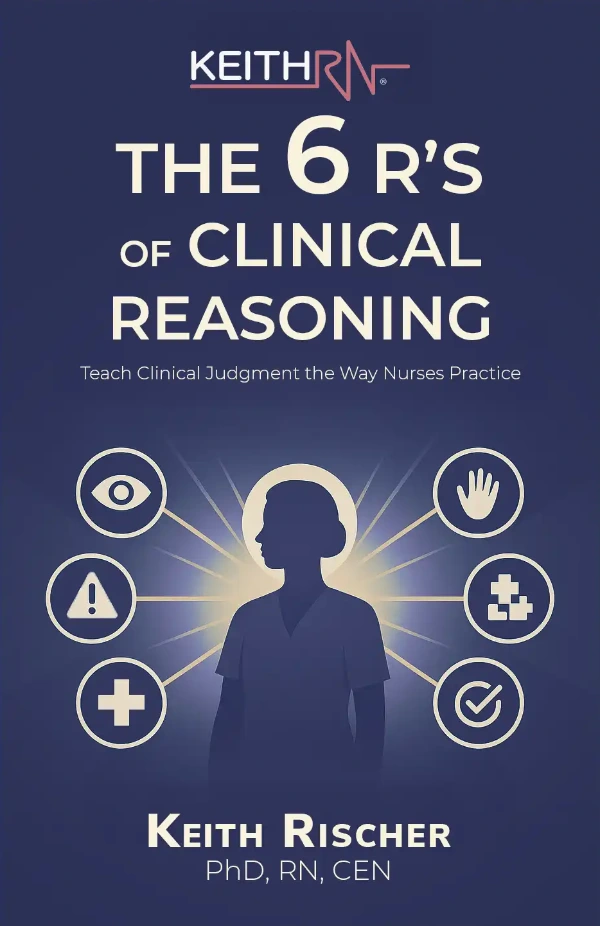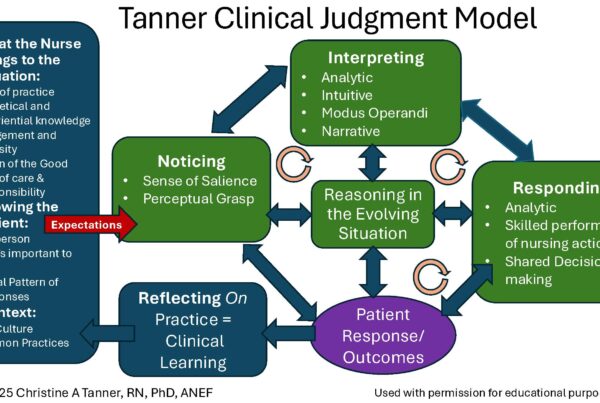
This blog post was written by Nelda Godfrey, PhD, ACNS-BC, RN, FAAN, ANEF, Professor and Associate Dean, Innovative Partnerships and Practice at the University of Kansas School of Nursing.
Thinking like a nurse is important, but do your students also understand what it means to act and feel like a nurse?
Understanding what it means to think, act and feel like a nurse reflects one’s professional identity. I had the pleasure of discussing the formation of professional identity in nursing students with Keith Rischer on Facebook and YouTube Live on Feb. 25, 2021.
I serve as the Associate Dean for Innovative Partnerships and Practice at the University of Kansas School of Nursing and am the co-creator and teacher of the three professional identity courses (total of 7 credits) in the University of Kansas BSN program. Long interested in identity formation in nursing, health professions and in all areas of higher education, I have spoken widely on this topic and have published with a number of interdisciplinary colleagues since 1997. \
In 2011 Dr. Nancy Crigger and I wrote The Making of Nurse Professionals: A Transformational, Ethical Approach — a philosophic inquiry of professionalism in nursing. With the support of the University of Kansas, we were able to host the first international think tank on professional identity in nursing in 2018.
Professional identity in nursing is defined as a “sense of oneself, and in relationship with others, that is influenced by characteristics, norms, and values of the nursing discipline, resulting in an individual thinking, acting and feeling like a nurse.” (Godfrey & Young, 2021)
During the pandemic, nurses are experiencing moral injury and trauma and compromising their moral principles by not being able to provide adequate patient care. What can we do to address these moral issues and ethical dilemmas?
We want nurses to be caring and compassionate, but in most nursing programs, there is no content that teaches how to intentionally develop a professional identity for our discipline of nursing.
In the early 2000s, medical educators were trying to cognitively teach professionalism, but they realized that students’ behaviors didn’t match faculty expectations. They found that professional identity formation was best taught—and assessed—with conversation and reflection.
Professional Identity Formation needs to be made explicit in nursing curricula. Dr. Patricia Benner, the lead researcher in the Carnegie Foundation’s educational research outlined in Educating Nurses: A Call for Radical Transformation, recognized the importance of emphasizing professional formation in addition to socialization into the profession.
The fourth of four recommendations in this important study suggests ‘a shift from role-taking and socialization to an emphasis on formation.’
Our think tank participants identified four pillars of professional identity formation that can guide nurse educators:
- Values and ethics. This includes honesty and respect, regard for human dignity, understanding of human flourishing, autonomy, justice, and altruism. Nightingale recognized the importance of character and service. Benner found that clinical judgment is influenced more by what a nurse brings to a situation ethically. How do you raise the bar of values and ethics with your students? Clinical and classroom faculty need to be intolerant to cheating to reinforce the idea that there is no place for dishonest nurses. One way nursing education can be less transactional and more transformative, is by faculty acting as role models of values and ethics in our programs. As go faculty, so go students. But faculty need best practices and support from their colleagues and program leader.
- Knowledge. Infobesity is a problem. Nurses must be competent in core areas. Conceptual learning helps cluster information so we don’t have to teach every condition and disease to our students. Focus on scholarship first, professional identity second, and caring third. AACN Essentials will help us know what’s most important to teach.
- Leadership. We’ve used this word so much that t sometimes loses its lost meaning. Every day, nurses are making a difference. And “making a difference” is a great way to define leadership! Nurses are in sacred spaces with patients and families. Nursing students must recognize their leadership as future nurses.
- Professional Comportment. We unconditionally assume positive intent with our students’ behaviors. Our first effort should be to prepare students to become nurses, within the guardrails of the nursing profession and the overall sense of professional identity.
How can nurse educators help develop Professional Identity Formation in their students?
- As faculty, we have a different role than we think we have. As faculty, we need to define the four pillars for us personally before we attempt to emphasize Professional Identity Formation with our students.
- Program administrators need to understand that we need structures to move Professional Identity Formation forward.
- Make the language about Professional Identity Formation explicit with students. New language and knowledge can be part of our undergrad programs nationally and internationally.
- Translate curriculum—emphasize values while teaching core knowledge areas.
- Get out of silos. Remember that classroom, clinical, and Professional Identity Formation are all connected.
How do you include Professional Identity Formation in class or clinical when you’re overwhelmed by transitioning back and forth between face-to-face and virtual learning?
Pre-licensure educators are in crisis mode, relegated to an unusual amount of transactional work brought on by the pandemic. It’s important to recognize this and be more intentional about being transformational. Bring forward the idea of the four pillars. Identify the values in Pillar 1 and ask students what they need to strengthen values and ethics. Look up Nightingale’s values of a nurse and reflect on that. Make it a priority for your students.
A better understanding of the professional identity of our chosen discipline will ground and empower students entering the profession.
Learn more about Professional Identity in Nursing.
Join the International Society for Professional Identity in Nursing by emailing Dr. Godfrey at ngodfrey@kumc.edu.
To learn more, watch the video of this conversation with Keith on Facebook Live:
KeithRN Resources to Help Develop Professional Identity
Clinical Dilemmas are a unique series of case studies that emphasize the importance of the “art” and ethical aspects of the nursing profession. Each scenario integrates the importance of caring, spiritual care, nurse engagement/presence, and ethical decision-making and its relevance to nursing practice.
Here are current topics posted on KeithRN:
Keith Rischer – PhD, RN, CEN
As a nurse with over 35 years of experience who remained in practice as an educator, I’ve witnessed the gap between how nursing is taught and how it is practiced, and I decided to do something about it! Read more…
The Ultimate Solution to Develop Clinical Judgment Skills
KeithRN’s Think Like a Nurse Membership
Access exclusive active learning resources for faculty and students, including KeithRN Case Studies, making it your go-to resource.




